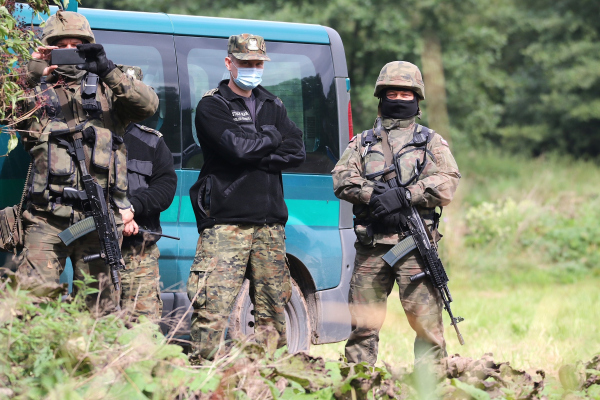
The HFHR submitted an opinion to the government's draft bill modifying the rules on the use of firearms by service officers and soldiers of the Armed Forces. The Foundation noted that the proposed exclusion of the unlawfulness of certain actions of service officers and soldiers could lead to a violation by Poland of the prohibition of torture and inhuman treatment.
The draft submitted to the Sejm excludes criminal liability of Police officers, Border Guard officers and soldiers of the armed forces who apply, in specific circumstances, direct coercion and firearms contrary to the rules of their use or their purpose. According to its assumptions, in certain cases, e.g. in the case of failing to drop a weapon or a dangerous object, an officer will not be criminally liable for violating the rules on the use of firearms, ‘provided that the circumstances under which he or she committed the behaviour in question required him or her to act immediately’.
In the HFHR's view, even increased migration pressure does not justify such radical changes. Migration, while used instrumentally by the authorities of Belarus or the Russian Federation, is not a military phenomenon. The border is crossed by civilians, including families with children, unaccompanied children, elderly people, sick people, and people with disabilities. Under these conditions, any use of direct coercion, especially firearms, should continue to be subject to far-reaching restrictions, including the principle of proportionality, and any misuse of these means should be assessed in terms of whether officers have committed an offence of exceeding their powers. The proposed regulation, which interferes with the sphere of authority of the services, may also raise concerns in the context of criminalising the provision of humanitarian assistance in the Polish-Belarusian border area and exposing those providing such assistance to repression.
In its opinion, the HFHR points out that the proposed solution will allow the disproportionate use of direct coercive measures and firearms, including a departure from key rules related to the use of weapons.
This type of solution is unnecessary. The rules already in place allow, in situations involving a threat to life or health, a deviation from certain regulations on the use of weapons or direct coercive measures. They provide a basis for action by officers, overruling the unlawfulness of such actions. Thus, in terms of their effects, they operate in the same way as the proposed regulations,’ points out attorney-at-law Marcin Wolny, lawyer of the HFHR.
he introduction of the provisions in question will result in impunity for officers who flagrantly violate the rules on the use of means of direct coercion and firearms. As a result of their introduction, the guarantee of impunity will be enjoyed, inter alia, by officers shooting rubber bullets at pregnant women or children, issuing an order to use firearms under the formula ‘shoot to kill’, as well as those who use them in a manner endangering the life or health of other officers or ordering the use of firearms by a coherent subunit.
Such solutions raise fundamental doubts in terms of their compliance with the Constitution of the Republic of Poland, according to which the Republic provides every human being with the legal protection of life, - emphasises Jarosław Jagura, lawyer for the HFHR.
The HFHR also drew attention to the incompatibility of the proposed solutions with Articles 2 and 3 of the Convention for the Protection of Human Rights and Fundamental Freedoms, stressing that the provisions of the Convention oblige the establishment of a legal and organisational framework defining the circumstances in which state officials may use force and firearms.
The Convention also requires a pre-trial investigation in situations where the use of force by an officer of the State has resulted in the death of a person. The introduction of the proposed counter-narrative will effectively make it impossible to conduct such proceedings and to know the specific circumstances in which the use of force occurred. This will expose us to liability before the European Court of Human Rights. - Marcin Wolny emphasises.
The Foundation was also critical of other changes to the Homeland Defence Act, including the introduction of separate rules for the use of means of direct coercion by soldiers in the armed forces, different from those concerning Police or Border Guard officers. ‘We believe this would stratify the rules on the use of means of direct coercion, making it unnecessary for soldiers to comply with, for example, the prohibition on using means of coercion other than physical force against pregnant women and children,’ - J. Jagura points out.


